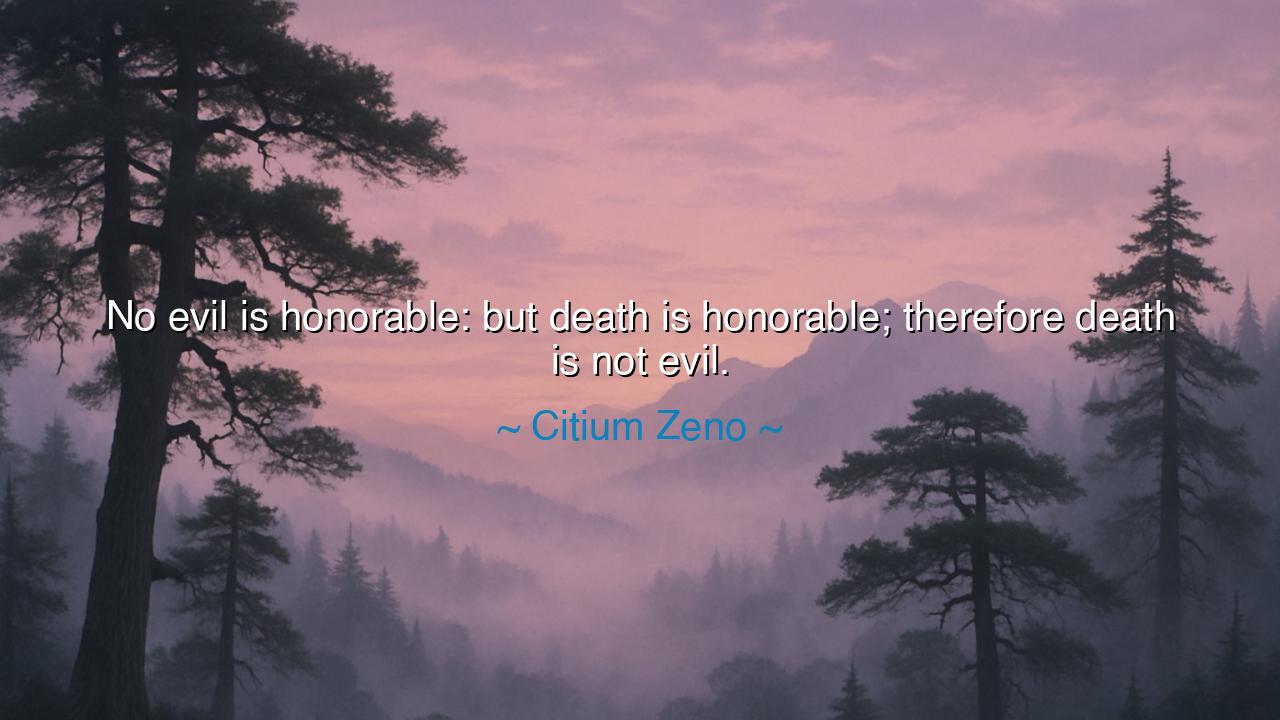
No evil is honorable: but death is honorable; therefore death is






The words of Zeno of Citium, founder of the Stoic school, “No evil is honorable: but death is honorable; therefore death is not evil,” strike the heart like a tempered blade of reason, gleaming with both clarity and courage. In these few lines, the ancient philosopher dismantles one of humanity’s oldest fears—the fear of death—and replaces it with understanding. He speaks not as one who defies mortality with arrogance, but as one who has gazed into its quiet face and seen not terror, but truth. For Zeno, death is neither curse nor punishment; it is a natural part of existence, woven into the fabric of life itself.
Zeno of Citium, who lived in the third century before Christ, was the founder of Stoicism, a philosophy that taught the mastery of emotion through virtue and reason. To the Stoics, nothing that accords with nature can be evil, for nature is the law of the divine order itself. They believed that virtue—the pursuit of moral excellence—was the only true good, and vice the only true evil. All else—wealth and poverty, pleasure and pain, life and death—were mere circumstances, indifferent in themselves. Thus, when Zeno declares that death is honorable, he reminds us that to meet death calmly, with dignity and reason, is a sign not of despair but of strength.
To the ancients, honor was not found in the length of one’s years, but in the quality of one’s living. A short life lived with virtue was greater than a long one spent in cowardice or deceit. Evil, therefore, could never be called honorable, for it corrupts the soul and stains the spirit. But death, when faced nobly, demands courage, acceptance, and the mastery of fear—qualities that are themselves virtues. Thus, Zeno’s reasoning flows like a clear stream: if death can be faced with honor, and if all that is honorable is good, then death cannot be evil. The wise man does not seek it, but neither does he flee it.
Consider the example of Socrates, who, centuries before Zeno, met his death with serenity and grace. Condemned unjustly by his city, he drank the hemlock calmly, speaking of the immortality of the soul and the purity of truth. His final act was not resistance, but acceptance—a submission not to men, but to reason itself. He feared neither pain nor the end, for he believed that what awaited him, though unknown, could not be evil if faced with a clear conscience. In this, he embodied Zeno’s teaching long before it was spoken: death, when met in harmony with virtue, is not an enemy, but a return home.
The Stoics saw death as the great equalizer, the inevitable return to nature’s embrace. A leaf that falls from the tree is not destroyed; it merely changes form, becoming nourishment for what is yet to grow. So too with man. To fear death is to misunderstand the rhythm of existence, for every beginning holds its end, and every ending gives birth to renewal. The true evil lies not in death, but in living dishonorably—in allowing fear, greed, or cruelty to rule the soul. The man who dies with virtue intact has triumphed over the only real evil there is: corruption of character.
In Zeno’s own life, this philosophy was no idle teaching. It is said that when he was old and infirm, he stumbled and broke his finger. Taking this as a sign that his time had come, he calmly left the world, thanking the gods for life and for the release that followed. To the Stoic mind, this was not suicide born of despair, but an act of harmony with fate—a recognition that his part in the great symphony of existence had been played, and that the time for silence had arrived. To such men, death was not defeat, but completion.
The lesson, then, for us who live in restless times, is this: do not fear death, but fear dishonor. Do not waste your days clinging to life at any cost; instead, live so nobly that death finds you unafraid. Cultivate virtue, that your conscience may be your shield. When sorrow comes, meet it with composure; when the end approaches, meet it as an old friend, not as a foe. For the one who lives in accord with truth, who serves others, and who keeps their soul unstained by evil, there is nothing in death to dread—only the peace of having fulfilled one’s purpose.
And so, as the ancients would say: Death is not evil, but the measure of a life well lived. It is the final test of the spirit, revealing whether one has lived in fear or in freedom. To live rightly is to prepare for it each day, not in mourning, but in mindfulness. For when the time comes to lay down the burden of the body, the one who has lived with honor will find, as Zeno taught, that death is not the enemy of life—but its crown.






AAdministratorAdministrator
Welcome, honored guests. Please leave a comment, we will respond soon